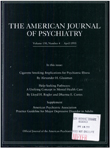Prolactin and cortisol responses to d-fenfluramine in major depression: evidence for diminished responsivity of central serotonergic function
Abstract
OBJECTIVE: Theoretically, d-fenfluramine should be a more selective serotonin (5-HT) challenge agent and has much greater clinical tolerance than the racemic compound that has previously been used. The authors' goal, therefore, was to look at 5-HT function in depression using the d isomer of fenfluramine as a probe. METHOD: They evaluated central 5-HT function in 23 patients with DSM-III-R-diagnosed major depression and 16 healthy control subjects. The depressed group included 10 men and 13 women; four were outpatients, two attended a day hospital facility, and 17 were inpatients. Subjects were cannulated at 8:30 a.m. after an overnight fast. After baseline samples were drawn, 30 mg of d-fenfluramine was administered orally and blood samples were drawn over the following 5-hour period for prolactin and cortisol estimation. RESULTS: The plasma prolactin responses of the depressed patients were significantly lower than those of the control subjects. This blunting was not related to the severity of the depression but was significantly related to the patients' levels of state anxiety. Cortisol responses as well as prolactin responses were impaired in depression. High baseline cortisol levels were correlated with the severity of depression and the presence of weight loss. CONCLUSIONS: Overall, these findings indicate that there is diminished 5-HT responsivity in the depressed state.
Access content
To read the fulltext, please use one of the options below to sign in or purchase access.- Personal login
- Institutional Login
- Sign in via OpenAthens
- Register for access
-
Please login/register if you wish to pair your device and check access availability.
Not a subscriber?
PsychiatryOnline subscription options offer access to the DSM-5 library, books, journals, CME, and patient resources. This all-in-one virtual library provides psychiatrists and mental health professionals with key resources for diagnosis, treatment, research, and professional development.
Need more help? PsychiatryOnline Customer Service may be reached by emailing [email protected] or by calling 800-368-5777 (in the U.S.) or 703-907-7322 (outside the U.S.).



